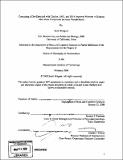Consuming a diet enriched with choline, UMP, and DHA improves memory in rodents when these compounds increase phospholipids
Author(s)
Holguin, Sarah, Ph. D. Massachusetts Institute of Technology
DownloadFull printable version (3.386Mb)
Other Contributors
Massachusetts Institute of Technology. Dept. of Brain and Cognitive Sciences.
Advisor
Richard J. Wurtman.
Terms of use
Metadata
Show full item recordAbstract
A new treatment tested in laboratory animals increases synaptic membrane and cholinergic neurotransmission. This treatment involves giving three compounds; DHA, a phosphatide precursor; choline, another phosphatide precursor present in the rodents' diets but not varied in this study; and UMP, a precursor of CTP, the rate-limiting compound in Kennedy Cycle production of phosphatides. Their administration increases the quantities of phosphatides, the major constituent of neuronal membrane, per brain cell, as well as specific synaptic proteins, the number of dendritic spines; and the expression of genes related to hippocampal glutamatergic neurotransmission. Since such membrane is the predominant component of synapses, the treatment might also ameliorate the loss of synapses occurring in the brains of Alzheimer's patients. My study involves assessing the behavioral effects of the treatment in individual rats or gerbils subsequently shown to manifest its neurochemical effects (i.e., increased phosphatides). My present findings show that the treatment improves performance on various tests of memory function. The largest improvements in memory function and increases in phosphatide levels are observed when DHA, choline, and UMP are consumed in combination.
Description
Thesis (Ph. D.)--Massachusetts Institute of Technology, Dept. of Brain and Cognitive Sciences, 2008. Includes bibliographical references.
Date issued
2008Department
Massachusetts Institute of Technology. Department of Brain and Cognitive SciencesPublisher
Massachusetts Institute of Technology
Keywords
Brain and Cognitive Sciences.